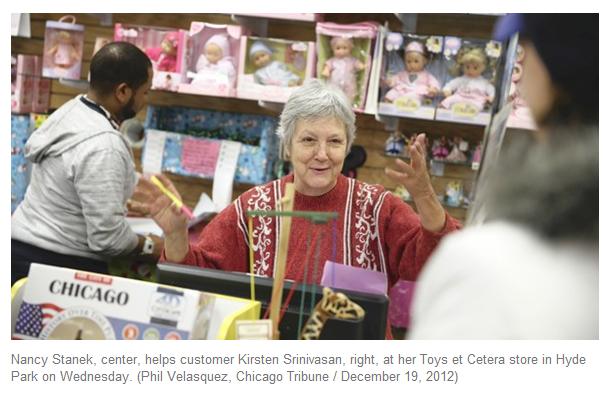
Nancy Stanek is used to predictions of her toy shops' demise.
In the 1970s, catalogs were expected to be the death of her Toys et Cetera stores.
Then it was the big-box discounters such as Wal-Mart and Target. More recently, the big, bad Internet was supposed to do her in.
Thirty-seven years and four locations later, Stanek and her stores are still around.
"I've invented and reinvented myself more times than I care to mention," she said. "You have to adjust to the changing times."
Stanek is not an anomaly. While the $22 billion toy industry braces for a sales slump this year of about 2 to 3 percent, several local toy sellers say they are holding their own.
"We have a saying in our industry," Stanek said. "Flat is the new up."
They are betting on a good year — with sales remaining steady or inching up by about 3 or 4 percent.
"When the financial crisis hit, we could really see people pulling back and being much more careful than they were," Ron Sebert said. He and his wife, Peggy, co-own Becky & Me Toys, which has locations in Glenview and Evanston. "That sort of caution has eased somewhat. At least in the market we're in," he said.
On a Saturday this month, Building Blocks Toy Store owner Katherine McHenry said she registered sales that were 27 percent higher than the same day last year. "There's no evidence this will be a bad year for us," she said.
One of the keys to the little stores' success, as they tell it, is selling toys that focus on what the child, rather than the toy, can do. And they claim to offer what mass merchants don't.
The specialty retailers don't make their money selling "hot toys" — shoppers are more likely to find skill builders such as Magna-Tiles and Keva Planks than Furbys and Barbies. At Building Blocks, the in-demand item this year is a kick scooter.
Another key, the store owners say, is keeping inventory tight and their ears to the ground for what customers want. And, just like for the chains, embracing the Internet is crucial.
"If you want to be in the game, you better be doing something online," said Toys et Cetera's Stanek, who four years ago began offering customers at her four Chicago locations the option to buy merchandise online and then pick it up in the store.
Social media sites such as Facebook and Twitter have been a boon to local shops. They spread the word among family and friends, according to Kathleen McHugh, president of the American Specialty Toy Retailing Association.
It doesn't hurt that independent toy sellers tend to be in neighborhoods flush with educated and affluent customers.
Building Blocks' McHenry put her stores in the pricey communities of Lakeview and Wicker Park.
Expertise has been crucial to her steady sales over 16 years, she said. Staff are trained to know the nuts and bolts of the merchandise they are selling — in many cases they've met the toy designer or manufacturer.
With little more information than the child's age, specialty toy sellers claim they can help a shopper home in on the right toy.
"We are experts at what we do," McHenry said. "A lot of people are shopping local, and they are proud of it and tell us when they check out."



